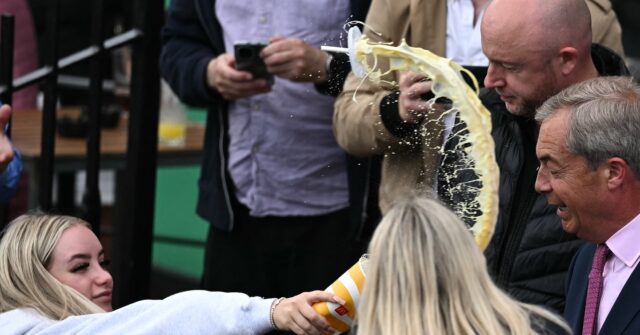In a recent incident that highlights ongoing discussions about justice in Britain, Victoria Thomas Bowen, a 25-year-old OnlyFans model, was sentenced for assaulting Reform UK leader Nigel Farage with a milkshake during a political event in Clacton-on-Sea. Bowen pleaded guilty to assault by beating and criminal damage for the attack that occurred on June 4th. While the Westminster Magistrates Court handed down a 13-week prison sentence, it was suspended for 12 months, which means she is unlikely to serve any actual time behind bars. This lenient sentence has sparked outrage and accusations of a two-tiered justice system, particularly in the context of politically motivated violence.
Bowen’s motivations for the assault were made clear during her police interview, where she expressed her disapproval of Farage’s political views, indicating that her actions were premeditated. This premeditation raised concerns regarding the normalization of violence against public figures, particularly those whose political ideologies diverge from more liberal perspectives. Farage himself voiced his discontent with the ruling, remarking that it sets a concerning precedent where one can assault a member of Parliament without facing prison time. This case signals growing unease about the safety of politicians and the rising tensions in political discourse in the UK.
The reaction to the sentencing was immediate and widespread, particularly across social media. Notably, activist Kellie-Jay Keene contrasted Bowen’s assault with the harsh penalties faced by others for speech-related offenses, emphasizing a perceived double standard in the justice system. This reflects a broader critique of how the legal system addresses political actions and supports the assertion that people are treated differently based on their citizenship or political affiliations. Social media users expressed outrage at what they consider a trivialization of physical assaults against public figures, particularly when it appears politically motivated.
Conversely, Bowen also garnered unexpected support from certain left-wing circles, as some celebrated her actions as a form of political resistance. Guardian columnist Owen Jones referred to images of the incident as “art,” showcasing a significant divide in public opinion regarding the limits of protest and acceptable forms of dissent. This incident reflects a troubling trend where violence, or the suggestion of violence, is romanticized in some political subcultures, which can lead to further polarization within society.
Bowen’s attempt to capitalize on her notoriety by promoting her OnlyFans account following the assault has drawn added criticism, suggesting a troubling intertwining of personal brand-building with violent acts. By using her offense to gain online followers and attract attention, she exemplifies a disturbing trend where the lines between actual aggression and performative acts blur, particularly among influencers in the age of social media. This behavior raises significant ethical questions about the impact of social media culture in glorifying violence as a means of political expression or personal gain.
This marks the second instance in a year where an individual attacking Farage has avoided substantial prison time. Earlier, a man named Josh Greally had similarly received a suspended sentence after pelting Farage’s campaign bus with cement. These cases together suggest a pattern in which assaults related to political activism result in leniency from the judicial system, prompting calls for reevaluation of how politically motivated violence is treated in courts. As debates continue over the implications of these rulings, the discourse surrounding political decorum, safety, and public sentencing norms remains more poignant than ever.

